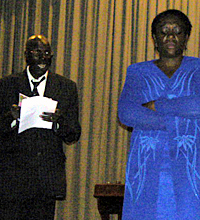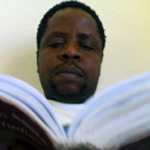










Abubakar Ibrahim
Arja Salafranca
Austin Kaluba
C. Mark-Beasant
Chi Onyemelukwe
Chris Mlalazi
Chuma Nwokolo
Cynthia Price
Dibussi Tande
Dike Okoro
Diran Adebayo
Egya Sule
Elizabeth Joss
Fiona Jamieson
Gertrude Makhaya
James Currey
Jarmo Pikkujamsa
Lakunle Jaiyesimi
Lauri Kubuitsile
M. M. N'Dongo
Megan Hall
Melissa de Villiers
Mildred Barya
M.Mashigoane
N Ayikwei Parkes
Nourdin Bejjit
Obe Mata
Patrick Iberi
Petina Gappah
P. Makhanya
Phindiwe Nkosi
Raisedon Baya
Rosemary Ekosso
Sachdeva Gaya
Tanure Ojaide
![]()
Credits:
Ntone Edjabe
Rudolf
Okonkwo
Tolu
Ogunlesi
Yomi
Ola
Molara Wood
![]()
|
||||||||||||
The Crocodile on the Zambezi The play was jointly written by Christopher Mlalazi and Raisedon Baya. It premiered in Bulawayo, Zimbabwe, in May 2008, in a production directed by Raisedon Baya. Originally scheduled to run for two days, it was closed down by the authorities after the first. This is the story of the aftermath of the first day's production. Read an Extract from the play |
||||||||||||
What
is this? Surprise divorce papers? |
||||||||||||
| Producing The Crocodile on the Zambezi | ||||||||||||
|
||||||||||||
It took us about two years to write The Crocodile of Zambezi. The story kept changing, making new demands on Chris Mlalazi and myself. It took the four actors two full months of rehearsals. The process was not smooth as those in theatre circles will testify, what with the cost of production creating daily headaches for producers. After two years of writing and two months of rehearsals we were all ready to take the play to the public. We were so confident of our product. The opening show was set for Wednesday 28 May 2008.The first signs of trouble appeared on Monday after The Chronicle failed to publish our adverts, which we had fully paid for. When we confronted them they gave us an unconvincing story about a technical fault. It was strange that this particular technical fault only affected our adverts and not anyone else’s. Wednesday night was mostly smooth. Save for the additional lights that balked at the last minute and one or two actors missing a couple of lines the show was almost perfect. Although this was not a funded project we were all excited, almost on cloud nine. The actors were balls of fire, the audience very expectant and receptive. They even promised to come back with others the next night. The show was promising to be a hit. Thursday was different. It was 29 May, exactly four weeks before the run-off elections. I left Bulawayo for Harare in the morning on business, leaving Lionel Nkosi, our production manager, in charge of everything. That same afternoon I received a call from Kudzi Kwangari of Radio Dialogue telling me that the police were asking about the play. Sensing trouble, I tried to call Lionel to warn him but it was too late. His phone rang on an on without being picked up. The police had picked him up already. Here is Lionel’s story I was coming from the shops where I had gone to buy some props. As I approached City Hall I saw Patrick Mabhena, one of the actors seated away from the Hall. I thought he was taking a smoke break or something. Gift Chakuvinga and Aleck Zulu were standing by the City Hall door with two strange men. As I approached I sensed danger but was too late to do anything. The two men were police officers. They took me and Aleck to the central police station where the member in charge told us that the play could not go on. The member in charge was rough at first but as soon as he took us to his office he became gentle, almost nice. “Look, we are the police and we don’t really understand anything about plays and drama. However, we have been told to censor or stop any suspicious performances.” We agreed to stop the show. Back at City Hall we packed
our things and were about to leave when a navy blue Madza 323 without
number plates parked in front of the hall. There were four men inside
and they asked me to get in. These were not your ordinary police
officers. We drove in silence, first to Ascot and then Christian
Brothers College. We then took a narrow path and ended up at a deserted
Hillside dam. We got out of the car and the questions started: “Where is the script for your play? And where is Raisedon? Where is he hiding?” “Why did you call your play the Crocodile of Zambezi? And who is this crocodile? Why didn’t you call it the crocodile of the dam or something else? Why the Crocodile of Zambezi? “What are you trying to do? Make fun of the President?” “How much did Radio Dialogue pay you? Are they your funders?” “Do you know we can kill you now? We have done it before. We can kill you and go and have supper without thinking twice about it.” Then the blows started raining. Left. Right. Centre. A sack was pulled over my head. Darkness. I was failing to breathe. My ribs were on fire. They were kicking at me. All four of them. A gun was shoved into my mouth. The beating continued. Four big men, kicking, pounding, trying to break my ribs. Blood. Darkness. Searing pain. I was soaking and almost drowning in my own blood. A medical check up confirmed a fractured ankle, bruised ribs, bruised gums and a shaking tooth. A message had been sent.
This version of Pastor Martin Niemoller’s poem should be on the minds of people, especially in these trying moments. For if they came for Lionel in broad daylight, then surely they can come for anyone else at anytime.
|
||||||||||||
|
||||||||||||
| Send to a friend | ||||||||||||



